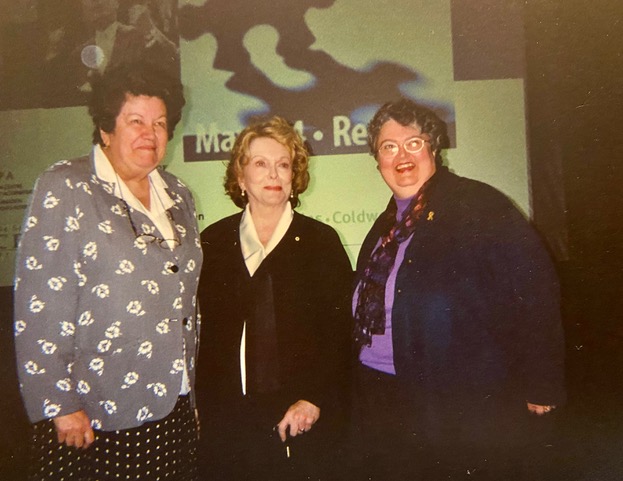Monique Bégin, visionary feminist and defender of health care equity, has died
A brilliant leader and proponent of social justice, Monique Bégin was an ally and friend of the Canadian Health Coalition. According to a news release from her family, the Honourable Monique Bégin passed away peacefully in Ottawa on September 8, 2023, after receiving palliative care. She was 87.
“Monique Bégin was a fierce defender of publicly funded, publicly delivered health care in Canada,” said Canadian Health Coalition Chair Pauline Worsfold, RN. “She also had a wicked sense of humour and a deeply entrenched sense of justice for all people living in Canada. May she rest in peace.”
“Without Monique Bégin in Pierre Trudeau’s cabinet, there would have been no Canada Health Act and no Medicare,” said Mike McBane, former National Coordinator of the Canadian Health Coalition. “She never abandoned her principles and had joie de vivre! Thank you, Monique, for envisioning a better Canada and working to make it happen.”
“Monique recognized that Medicare was always going to be under attack from for profit interests. She maintained the courage of her convictions and belief in social justice and equity, and pushed on.”
KATHLEEN CONNORS, FORMER CHAIR OF THE CANADIAN HEALTH COALITION

The Canada Health Act, passed in 1984, sets out the primary objective of Canadian health care policy, which is “to protect, promote and restore the physical and mental well-being of residents of Canada and to facilitate reasonable access to health services without financial or other barriers.”
Kathleen Connors, the former head of the board of the Canadian Health Coalition, now living in St John’s Newfoundland, said Monique Bégin took on powerful opponents of the Canada Health Act in the Liberal caucus.
“Monique recognized that Medicare was always going to be under attack from for profit interests. She maintained the courage of her convictions and belief in social justice and equity, and pushed on. She was committed to the five principles of the Canada Health Act: universality, portability, accessibility, public administration, and comprehensiveness,” said Connors.
Bégin was present at the first Canadian Health Coalition SOS Medicare conference in Ottawa in 1979, also known as the founding conference of the coalition. As quoted in the 2007 book, Medicare: Facts, Myths, Problems & Promise, edited by Bruce Campbell and Greg Marchildon, Bégin said, “… after another four long, painful, and often bitter and vicious years, the Canada Health Act (1984) was unanimously passed by the House of Commons. Why did it pass? For a very simple reason: the public wanted it. And thanks also to the support of groups like the Canadian Health Coalition.”
Bégin also launched the policy of devolution of health services to First Nations communities and created a development program for their health professionals.
Among the first three Québec women elected to the House of Commons in 1972, Bégin joined Jeanne Sauvé and Albanie Morin in Ottawa.
In her memoir entitled, Ladies, Upstairs!, Bégin outlined the pervading sexism of Canadian public life from the point of view of a feisty, candid outsider.
Born in Rome, Italy, on March 1, 1936, to a Canadian father and a Flemish mother, she came to Canada as a refugee after the Second World War. She was the eldest of a large family who moved to the Notre-Dame-de-Grâce neighborhood of Montreal.
Bégin began her education in 1942 at the local school in NDG. She completed her Bachelor of Arts and Masters degree in Sociology from Université de Montréal, and doctoral studies at the University of Paris (Sorbonne).
In 1966, she was a signatory of the founding charter of the Fédération des femmes du Québec, serving as its first vice-president. In 1967, she was appointed Secretary General of the Royal Commission of Inquiry into the Status of Women in Canada, which published its report in 1970.
In 1972, she became a Liberal MP, and was appointed to Cabinet by Prime Minister Pierre Elliott Trudeau in 1976 as Minister for National Revenue (1976-77), and then Minister for National Health and Welfare (1977-79 and 1980-84). In government, she made an impact with her vision and social conscience.
As a passionate sociologist, she created the child tax credit and championed legislation to increase the guaranteed income supplement.
Following 12 years in federal politics, she returned to teaching and academia, becoming the first holder of the Joint Chair in Women’s Studies at the University of Ottawa and Carleton University (1986-90), then Dean of the Faculty of Health Sciences at the University of Ottawa (1990-97).
A final tribute will be paid to Bégin during a public commemorative ceremony to be held on November 2 at the Tabaret Hall at University of Ottawa (550 Cumberland Street).
Cover photo: Monique Bégin, Minister of National Health and Welfare, and Justice Emmett Hall. Courtesy of Monique Bégin. From the National Museum of History.


